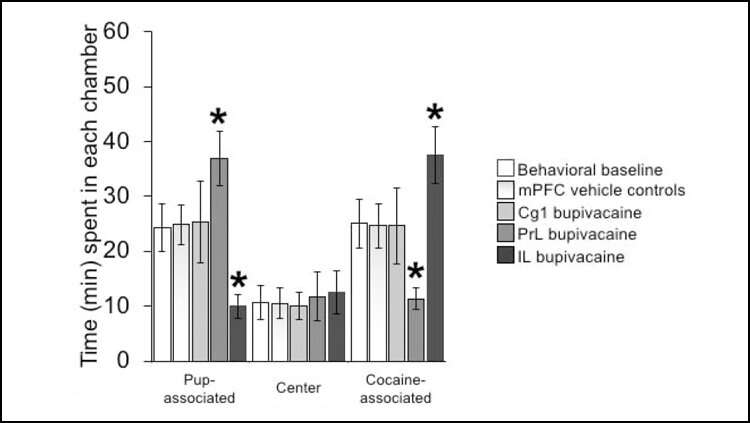Deactivating the prelimbic cortex (dark grey) increased preference for pups and decreased preference for cocaine. Deactivating the infralimbic cortex (black) increased preference for cocaine and decreased preference for pups. Credit: Pereira and Morrell, eNeuro 2020
Motherhood takes over the brain's decision-making regions to prioritize caring for offspring, according to new research in rats published in eNeuro.
Making decisions requires the medial prefrontal cortex filtering and repressing multiple streams of information. This often involves picking between powerful, conflicting stimuli, such as when drug-using mothers must choose between their new child or drug-seeking. Since the most effective addiction therapies in this situation work by emphasizing the mother/infant relationship, Pereira and Morrell hypothesized that a brain region must direct a mother to prioritize offspring over drugs.
To pinpoint this brain region, the team temporarily inactivated different regions of rats' prefrontal cortices with a local anesthetic and tested the rats' preference for their pups or cocaine. Before inactivation, 40% of rats preferred to spend time in a room associated with cocaine, 40% preferred a pup-associated room, and 20% preferred a neutral room.
But when the scientists inactivated the rats' infralimbic cortex, 78% of rats preferred the cocaine room and none chose the pup room. The opposite was true when the prelimbic cortex was inactivated: 71% of rats preferred the pup room, and none chose the cocaine room. Inactivating the infralimbic cortex also decreased the mother's maternal behaviors towards her pups. The researchers found that during motherhood, the brain recruits the discriminating powers of the infralimbic cortex to prioritize offspring over competing desires.
More information: Infralimbic Cortex Biases Preference Decision Making for Offspring Over Competing Cocaine Associated Stimuli in New Mother Rats, eNeuro, DOI: 10.1523/ENEURO.0460-19.2020
Provided by Society for Neuroscience























